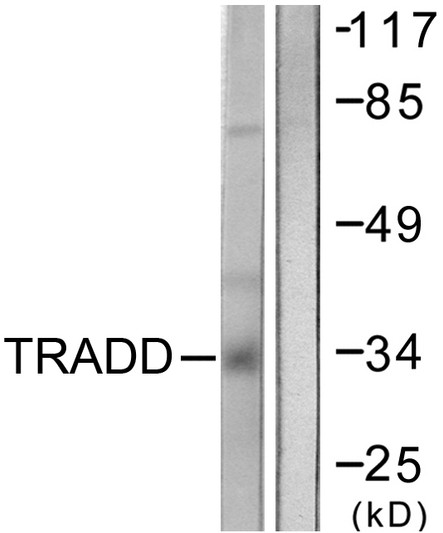| Host: | Rabbit |
| Applications: | WB/IHC/IF/ELISA |
| Reactivity: | Human/Mouse/Monkey |
| Note: | STRICTLY FOR FURTHER SCIENTIFIC RESEARCH USE ONLY (RUO). MUST NOT TO BE USED IN DIAGNOSTIC OR THERAPEUTIC APPLICATIONS. |
| Short Description : | Rabbit polyclonal antibody anti-Tumor necrosis factor receptor type 1-associated DEATH domain protein (251-300 aa) is suitable for use in Western Blot, Immunohistochemistry, Immunofluorescence and ELISA research applications. |
| Clonality : | Polyclonal |
| Conjugation: | Unconjugated |
| Isotype: | IgG |
| Formulation: | Liquid in PBS containing 50% Glycerol, 0.5% BSA and 0.02% Sodium Azide. |
| Purification: | The antibody was affinity-purified from rabbit antiserum by affinity-chromatography using epitope-specific immunogen. |
| Concentration: | 1 mg/mL |
| Dilution Range: | WB 1:500-1:2000IHC 1:100-1:300ELISA 1:10000IF 1:50-200 |
| Storage Instruction: | Store at-20°C for up to 1 year from the date of receipt, and avoid repeat freeze-thaw cycles. |
| Gene Symbol: | TRADD |
| Gene ID: | 8717 |
| Uniprot ID: | TRADD_HUMAN |
| Immunogen Region: | 251-300 aa |
| Specificity: | TRADD Polyclonal Antibody detects endogenous levels of TRADD protein. |
| Immunogen: | The antiserum was produced against synthesized peptide derived from the human TRADD at the amino acid range 251-300 |
| Post Translational Modifications | (Microbial infection) Glycosylated at Arg-235 by enteropathogenic E.coli protein NleB1, C.rodentium protein NleB and S.typhimurium proteins Ssek1 and Ssek3: arginine GlcNAcylation prevents homotypic/heterotypic death domain interactions and assembly of the oligomeric TNFRSF1A/TNFR1 complex, thereby disrupting TNF signaling. |
| Function | Adapter molecule for TNFRSF1A/TNFR1 that specifically associates with the cytoplasmic domain of activated TNFRSF1A/TNFR1 mediating its interaction with FADD. Overexpression of TRADD leads to two major TNF-induced responses, apoptosis and activation of NF-kappa-B. The nuclear form acts as a tumor suppressor by preventing ubiquitination and degradation of isoform p19ARF/ARF of CDKN2A by TRIP12: acts by interacting with TRIP12, leading to disrupt interaction between TRIP12 and isoform p19ARF/ARF of CDKN2A. |
| Protein Name | Tumor Necrosis Factor Receptor Type 1-Associated Death Domain ProteinTnfr1-Associated Death Domain ProteinTnfrsf1a-Associated Via Death Domain |
| Database Links | Reactome: R-HSA-140534Reactome: R-HSA-3371378Reactome: R-HSA-5213460Reactome: R-HSA-5218900Reactome: R-HSA-5357786Reactome: R-HSA-5357905Reactome: R-HSA-5357956Reactome: R-HSA-5675482Reactome: R-HSA-69416Reactome: R-HSA-75893Reactome: R-HSA-9693928 |
| Cellular Localisation | NucleusCytoplasmCytoskeletonShuttles Between The Cytoplasm And The Nucleus |
| Alternative Antibody Names | Anti-Tumor Necrosis Factor Receptor Type 1-Associated Death Domain Protein antibodyAnti-Tnfr1-Associated Death Domain Protein antibodyAnti-Tnfrsf1a-Associated Via Death Domain antibodyAnti-TRADD antibody |
Information sourced from Uniprot.org












